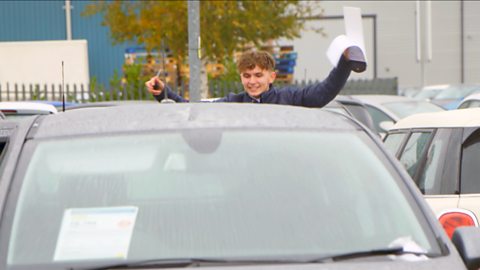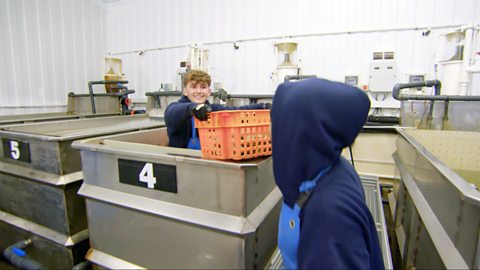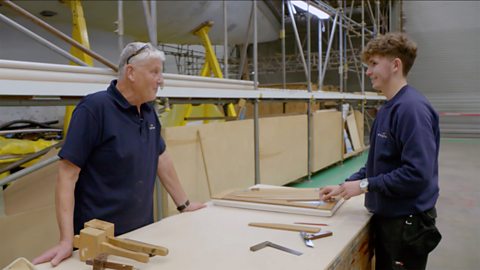In The Nine to Five with Stacey Dooley on BBC iPlayer, Stacey takes five teenagers into four different industries for the ultimate work experience. Each school leaver spends two days trying out real jobs and if they impress, Stacey will pay them the national apprenticeship wage at the end of every shift. But she also deducts money for poor performance and so those who don't come up to scratch can find their wage packet empty.
Stacey reflects here on 17-year-old Sam, who was so super competitive, his feet didn’t touch the ground. But over the course of his experience, he recognised that slow and steady can actually win the race!
I have to confess that at times I am a competitive person – that’s one of the reasons I decided to take part in Strictly and I worked so hard learning a myriad of new dances to go on and win the glitter ball! As a personal quality, competitiveness can be the fuel to chase your dreams. It can get you up in the morning to carry on and give you the energy to push forward when you face setbacks. In the workplace, it can lead a whole team to victory. But sometimes, it can take over and without realising it, you are setting yourself against your peers when you don’t need to. The question is: does competitiveness always win in the workplace?
Watch The Nine to Five with Stacey Dooley on iPlayer. collection
Five teens, four industries. Will they thrive or struggle?

Watch Sam's Bitesize story here!
Sam
I'm Sam. I'm 17 years old and I'm from Cardiff and I just finished work experience on the Nine to Five.
Sam
Over the top… How's that?
Sam
I came into this process wanting to get as much life experience as I possibly could get and I definitely, definitely got that.
Layla
You found it?
Sam
It's unbelievable. You'll never see anything like this again. Speedy Gonzales.
Sam
I'm probably one of the most competitive people that you're ever going to meet, and I think that probably comes from my love of sports.
Sam
I tend to think under the brighter lights the more I tend to, tend to shine, do you know what I mean?
Sam
It all started at the car dealership. Hmmm current mileage… Ahh, I've done it.
Sam
Fingers crossed. Mismatch. Second time!
Sam
I think it's important to show that you're confident in the workplace. I think it's also important to be competitive at times. But personally, I was only really looking at the positive side of being competitive and not the negative side.
Sam
Golly, that's a lot of colour choices. Take a guess, it just looks blue. No, it looks desert island blue.
Stacey
I love Sam's attitude, but he's whizzing through the cars because he wants to be the fastest.
Sam
I think it's so much more important to focus on being first in quality rather than first in speed and time. I think my eagerness to finish first definitely let me down at certain points I have to admit.
Paul H
That's even worse than the last time.
Sam
How have I done that?
Sam
I'm having a nightmare.
Paul H
I think you need to slow down a little bit.
Sam
Yeah.
Paul H
You gonna cost us a lot of money.
Sam
Look I promise carpentry is so much harder than it looks, I mean who knew teak cost so much money. I think, in all seriousness, though, I lost sight of what I was doing because I was rushing so much. And by losing site of what I was doing, that's never going to be good for any business.
Sam
It's competition time again. I love it. It's brilliant. Bakr's on his first he's slightly ahead of me as far as I know, but I'm, I'm used to this as soon as I get going, I get going.
Bakr
I think Sam's… Trying to rush through the job, but you've gotta to take your time, you've gotta take your pride in it.
Sam
Having Bakr as my competition definitely lit a fire inside of me, which made me want to do the best that I possibly could, but I realised by the end of it that to do the best I possibly could I needed to instead of putting myself against Bakr, we need to draw on each other's strengths.
Ricky
You're competing with people who actually aren't competing with you and I saw that certainly when we were doing the yachts. You were rushing what is a considered precision quality task, because you wanted to get it done first.
Sam
I was much stronger both mentally and physically than I thought I was.
Sam
Ready for more?
Ellie
Oh!
Sam
There we go…
Sam
I think by pushing myself and by accepting that challenge that I got on the day when the going got tough. I really, I really dug in.
Layla
This is exactly why I hired you, I knew you would do an amazing job.
Sam
That's high praise. That's high praise from the boss right there.
Sam
The most important thing you can do is just compare yourself against yourself and try and level up from the person you were the day before.
Sam
This is the make or break. There's like-uh. Oh…
Sam
Yes!
JT
What was that?
Sam
I got one!
JT
You got one out of how many?
Sam
Five.
Sam
If you're not great at something straight away, as long as you keep chipping away at it, you're going to get there in the end, and you are gonna improve.
Sam
Ah, it's two hundred exactly.
JT
Fantastic.
Sam
To the third Decimal, JT!
Sam
I've learnt that finding a career is a process of elimination, but once you find that thing that you really love and you're really good at you just gotta go for it.
Stacey
Is this the first time?
Sam
It is, yeah.
Stacey
Yes!
Sam
It's my first, full pay. So, we're off and running now. Fingers crossed for many more, yeah.
Sam
So, I decided to write a song about the highs and lows of the experience.
Sam
'Cos we met friends and we met family. Thirty-three pounds was our salary, I hope my family are proud of me. Just take in every second and I know that they are bound to be.
Sam
Here are the top five things that I learnt about being super competitive and how slow and steady really does win the race.
Sam
I cut my first piece too short, so I've had to start again.
Sam
Being competitive is a great attribute to have, because I think it fuels you to do the best you possibly can and I think that's exactly what employers are looking for, but just be careful that you channel it in the right way.
Stacey
You were leaning on, Sam quite heavily.
Ellie
I mean, he offers to do it though, he's so nice.
Sam
Work is all about quality and not getting through things as fast as you possibly can.
Sam
This isn't the most strenuous task in the world. So, it's main… mainly just the attention to detail on this I think.
Sam
So, the competition's always with yourself and not with your peers.
Sam
The winner in the FA Cup Final.
Sam
And you're not always going to be brilliant at something straight away. So, don't be disheartened when you're not.
Sam
Get in!
Sam
I've learnt how to channel my competitive side to benefit me and the people around me. Compare yourself to who you were yesterday and try and level up from that. I'd say that's one nil to me!
They say always keep your eye on the ball. That is the fundamental basis for our nation’s much beloved sport: football! Each player has a natural competitive streak inside of them, and each fan has it too. That’s why we holler from the sidelines to support individual players, to give them an enormous boost and spur on our chosen team to victory. There’s group adrenaline and the joy of the win is shared! Natural competitiveness is essential to any sport and the ultimate aim is to sprint to the top of the leaderboard, take home the gold medal or lift the final trophy aloft.

Channel that energy
But try and imagine if a player was so fired up that they couldn’t keep to their position and constantly tackled their own teammates to steal the ball… they would quickly find themselves on the side bench! There is absolutely nothing wrong with a healthy dose of competitiveness in the workplace but you have to know where to channel that energy. It isn’t about who gets something done the quickest, quality always comes first.
One of our teens, Sam, had a sports background and had so much energy and so much determination he was like a whirlwind at work. At the car dealership, he was speeding around the forecourt doing his checklist and bosses were standing back watching in amazement. He decided too that he wanted to ‘win’ over his teammate Bakr but over the two days he learnt he didn’t need to do that, he just needed to do the best for himself. It was a tricky lesson for someone who was so used to giving it his all to win on the sports field. Also his speed was actually a hindrance because even though he was talented and very capable, he was making mistakes as he rushed through things in his efforts to be first.


Pace yourself
So always try and pace yourself and put the quality first and speed second.By all means, let your natural competitiveness drive you and give you the oomph to get out there but also make sure you settle, take stock and let your natural talents shine through slowly – you will be seen!
At the oyster farm, Sam’s determination was clear in his work ethic and he never gave up lifting the heavy oyster bags to support his teammates Ellie and Tillie. There, his competitiveness gave him the zeal to keep going, to power on through, and he was using it to give his teammates the help they really needed. So always try and harness your competitiveness for the greater good of the team – people will always be grateful if you can do the things they are struggling with.
However, when we got to the boat building company, he fell back into old habits and was competing against Bakr again. It was precise and painstaking work, and working with expensive wood like teak is not something that can be rushed. Sam got caught up in doing it as quickly as possible and once again he made mistakes; the panels couldn’t be fitted to make a door and a day’s work had gone to waste. Attention to detail is a real transferable skill that will benefit you in the workplace. Sam learnt over time that his energy was a huge asset to himself and his team but he just had to direct it in the right way.


Walk don’t sprint
So compete with who you were yesterday, not with who someone else is today. Rather than using the person next to you as the measuring stick to your success, focus on what you’re doing and how to make your work better. In any industry, bosses will expect you to be able to reflect on your own strengths and weaknesses because someone who can think it through calmly themselves is someone who can improve. Some tasks take a lot of time to master and some races aren’t won by sprinting as fast as you can – developing successfully in the workplace is a long game!
The downside of seeing everything as a competition is to see everything as a win or loss. But that isn’t the reality at work. You may not be great immediately at everything you do and it’s important that when someone gives you advice on how to do it better, you don't see this as a failure, but as an opportunity to learn. Sam realised that he was focusing so hard on competing with everyone that sometimes he lost sight of the whole reason he was doing the work experience to begin with: to learn. Ironically, I think that was the biggest learning curve for him.
Don’t aim to be the best, aim to be the best ‘you’ can be. That’s how you build a long-lasting career. If you can see everything as a chance to keep improving rather than a win or a loss, then you will have a source of motivation that can nourish you for your entire career. Trust me, that is how you truly ‘win’.


The Nine to Five: Five teens, five industries. Will they thrive or struggle? collection
Advice and stories from Stacey Dooley and 16-18-year-olds on the ultimate work experience on The Nine to Five.
